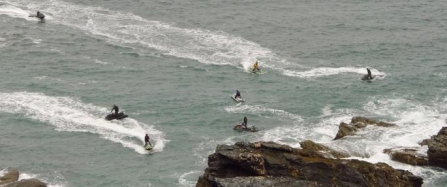
Cornwall Seal Group and Research Trust

Cornwall Seal Group and Research Trust
Ruth Williams, Marine Conservation Manager for the Trust says,
“The disturbances have mainly involved seals and sea birds by tripper boats and kayakers, who because they are paddling quietly along, don’t realise they are disturbing the wildlife”.
As large numbers of holiday makers flock to the Cornish coast, the Cornwall Marine and Coastal Code Group is now reminding everyone about how to enjoy watching marine wildlife such as dolphins and basking sharks responsibly.
Dan Jarvis from British Divers Marine Life Rescue, one of the Group’s member organisations says,
“Cornwall has an amazing range of marine species that are a big part of why lots of people love to visit this region, but sometimes people’s encounters with our wildlife do not go well for the animals involved”.
“We are incredibly fortunate that we have these animals here in the first place and it is a privilege that we’re able to see them, so we want to help people get the best out of these encounters by following some simple guidelines that will avoid causing distress and harm”.
The species most often affected, as has been shown over the past few weeks, are seabirds and seals as they come on to land to rest, but dolphins and basking sharks close to shore will quickly attract a lot of attention, making them vulnerable to overcrowding or being chased and this can lead to accidents.
One such incident off Padstow in 2013 resulted in the death of a bottlenose dolphin calf from the local inshore pod that has only around 18 individuals, threatening the long-term survival of the group. The people responsible were successfully prosecuted.
The Group’s recommendations include:
• Keep your distance from resting animals such as seals and seabirds on land
• Remain calm and quiet so resting animals are not disturbed and scared off
• Move slowly and avoid sudden changes in direction and speed if animals are nearby
• Stay side on to the animals while watching them rather than approaching directly
• If there are other boats or kayaks or other water users nearby then ensure the animals have plenty of space and an obvious escape route should they choose to leave, and do not pursue them when they do
The full guidelines can be found on www.cornwallwildlifetrust.org.uk/living-seas/cornwall-marine-and-coastal....
Dan Jarvis continues,
“By encouraging people to use these guidelines, we hope that they, in turn, will share them with others, so that many more people are aware of how their actions, and those of others, can affect the behaviour of animals that need to use these habitats too. At the end of the day we are all out on the coast to enjoy the amazing environment we have here and we need to make sure the animals that live there are still able to enjoy it too, otherwise they could abandon the area and we all lose out”.
Incidents of disturbance can be reported to the Cornwall Wildlife Trust’s disturbance hotline on 0345 201 2626. Meanwhile, the full laws protecting marine species can be found at HERE